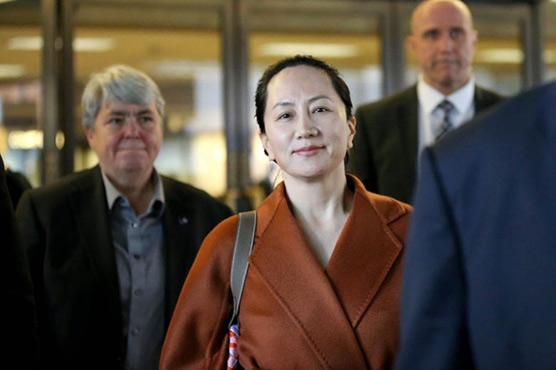Huawei CFO fighting U.S. extradition says her rights were violated

Meng, 47, was detained at Vancouver's airport on Dec. 1 at the request of the United States
VANCOUVER (Reuters) - Huawei Chief Financial Officer Meng Wanzhou returned to a Vancouver court on Tuesday as her lawyers argued that Canadian authorities abused their powers and violated her rights to gather evidence against her, a claim the government denies.
Meng, 47, was detained at Vancouver’s airport on Dec. 1 at the request of the United States, where she is charged with bank fraud and accused of misleading HSBC Holdings Plc about Huawei Technologies Co Ltd’s business in Iran. She has said she is innocent and is fighting extradition.
Meng was searched and questioned by border officials at the airport after she landed on a flight from Hong Kong. However, it was not until three hours after her arrival that Canadian police arrested Meng and her constitutional rights were invoked.
On Tuesday, the second day of a hearing before Justice Heather Holmes in British Columbia Supreme Court, Meng lawyers continued to push for more disclosure from the government about her detention and arrest.
Evidence shows police originally planned to board Meng’s flight from once it landed in Vancouver and arrest her, her lawyers said, noting the warrant called for immediate arrest. However, that plan changed after a meeting between border and police officials, although the reasons for the change were not clear and, they said, resulted in Meng’s constitutional rights being violated.
Meng lawyer Richard Peck told the judge no one answered Meng when she repeatedly asked border officials why she was being detained. “She was not told she was the subject of an arrest warrant,” Peck said. “She was not told this was a warrant that came out of the U.S. that had to do with activities some years ago.”
As her lawyers spoke, Meng sat next to an interpreter in the well of the courtroom, wearing a short black dress with glittering sequins around the neckline and sleeves. An electronic monitoring device was strapped to her left ankle.
Meng’s lawyers plan to complete their arguments on Wednesday and counsel for the Attorney General of Canada is expected to tell the judge the government view when the hearing resumes on Monday.
The extradition hearing itself is set to begin in January in a legal effort that could go on for years.
‘FISHING EXPEDITION’
The defense claims that, if the process was abused, it justifies halting extradition proceedings. The government claims Meng’s lawyers have not shown her claims could stop the proceedings. In its filing, it called the defense’s effort for more disclosure a “fishing expedition.”
At Tuesday’s hearing, Scott Fenton, another Meng lawyer, told the judge authorities committed “serious violations” of Meng’s charter rights when border officials gathered evidence for the Canadian police and the U.S. Federal Bureau of Investigation, including seizing Meng’s phones and getting her to reveal their passwords.
“There was no legitimate reason for the warrant not to be executed according to the terms,” Fenton said, referring to plans to arrest her immediately upon arrival.
Fenton said Meng had a right to be free from arbitrary detention and from unreasonable search and seizure, a right to understand the reason for her detention, a right to counsel and a right to silence.
In a filing released on Monday, the attorney general of Canada said there was no evidence border officials or police acted improperly, or that the conduct of Canadian or foreign officials compromised the fairness of the extradition proceedings.
The arrest has strained China’s relations with both the United States and Canada. In Beijing, China’s Foreign Ministry reiterated the government’s call for Meng to be released and allowed to return to China.
Meng’s lawyers say the United States is using the CFO for economic and political gain, noting that after her arrest, U.S. President Donald Trump said he would intervene if it would help close a trade deal.
Meng, the daughter of Huawei founder Ren Zhengfei, spent 10 days in jail in December but was then released on C$10 million ($7.5 million) bail and is living in one of her two multimillion-dollar homes in Vancouver.
Huawei, the world’s largest telecommunications equipment maker, has been accused by the United States of activities contrary to national security or foreign policy interests. It is also a defendant in the U.S. case against Meng. Huawei denies the charges.

